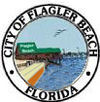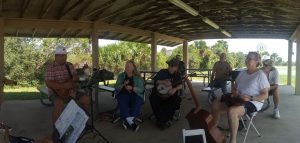
To include your event in the Briefing and Live Calendar, please fill out this form.
Weather: Sunny, with a high near 79. Breezy, with a west wind 5 to 15 mph, with gusts as high as 23 mph. Sunday Night: Partly cloudy, with a low around 58. West wind 7 to 10 mph, with gusts as high as 16 mph.
- Daily weather briefing from the National Weather Service in Jacksonville here.
- Drought conditions here. (What is the Keetch-Byram drought index?).
- Check today’s tides in Daytona Beach (a few minutes off from Flagler Beach) here.
- Tropical cyclone activity here, and even more details here.
Today at a Glance:
ESL Bible Studies for Intermediate and Advanced Students: 9:30 to 10:25 a.m. at Grace Presbyterian Church, 1225 Royal Palms Parkway, Palm Coast. Improve your English skills while studying the Bible. This study is geared toward intermediate and advanced level English Language Learners.
Palm Coast Farmers’ Market at European Village: The city’s only farmers’ market is open every Sunday from noon to 4 p.m. at European Village, 101 Palm Harbor Pkwy, Palm Coast. With fruit, veggies, other goodies and live music. For Vendor Information email [email protected]
‘Around the World in 80 Days’ at City Rep Theatre, 3 p.m. Adults, $25, youth, $15. Buckle up for a whirlwind journey with CRT’s revival of Around the World in 80 Days! This high-energy adaptation of the Jules Verne classic follows fearless Phileas Fogg as he races across the globe. With clever staging, quick-changing characters, and nonstop laughs, it’s a theatrical adventure full of heart, hilarity, and wonder. A fast-paced, fantastical adventure for the whole family
Thornton Wilder’s ‘Our Town,’ at Limelight Theatre in St. Augustine, 11 Old Mission Avenue, St. Augustine. 7:30 p.m. most days, with matinees on Sundays, at 2 p.m., and on Nov. 15. Thornton Wilder’s timeless masterpiece chat quietly and powerfully explores life, love, and loss in small-town America. A deeply human story that resonates with every audience.
Grace Community Food Pantry, 245 Education Way, Bunnell, drive-thru open today from noon to 3 p.m. The food pantry is organized by Pastor Charles Silano and Grace Community Food Pantry, a Disaster Relief Agency in Flagler County. Feeding Northeast Florida helps local children and families, seniors and active and retired military members who struggle to put food on the table. Working with local grocery stores, manufacturers, and farms we rescue high-quality food that would normally be wasted and transform it into meals for those in need. The Flagler County School District provides space for much of the food pantry storage and operations. Call 386-586-2653 to help, volunteer or donate.
Al-Anon Family Groups: Help and hope for families and friends of alcoholics. Meetings are every Sunday at Silver Dollar II Club, Suite 707, 2729 E Moody Blvd., Bunnell, and on zoom. More local meetings available and online too. Call 904-315-0233 or see the list of Flagler, Volusia, Putnam and St. Johns County meetings here.
Byblos: John Cheever is one of the three or four greatest American short story writers of the 20th century. He died in 1982 in Ossining, which means I was very close to him on several occasions, as I used to visit a friend there in those years (it is also where my mother and my second father met), though I did not know Cheever existed back then anymore than he knew I did. Like most I discovered him through The Stories of John Cheever, the collection of 61 stories he published between 1946 and 1975, starting with “The Sutton Place Story” and the wonderful “Enormous Radio” which, once you’ve read it, will never stop playing in your mind, sometimes playing tricks with your mind. A few years ago the Library of America published his collected stories, along with a few uncollected ones, and all his published novels (he destroyed a few). It’s only when I read an Updike review of a Cheever biography a few days ago that I learned that there are some 60 stories he published, most of them in The New Yorker, some in The New Republic and other magazines, that have never been collected. He refused to republish all 45 or 47 stories he published between 1935 and 1946 in The New Yorker. But if you have a subscription to the magazine, you have access to its archives–and to all those stories, listed kindly by date of issue, with page numbers, by the unfortunately defunct HTML Giant. I picked up the very first one: “Brooklyn Rooming House,” about a Mrs. Moreno, landlord of an apartment building she doesn’t own and has never earned enough to buy in 15 years as landlady. Her one obsession is to run a respectable rooming house. She will not tolerate drunkards. “I may starve myself, I may not have enough to pay the coal bill, but I’m going to have a respectable house,” she tells one of the tenants, the narrator. But it’s the Depression (written with a small d in those days), and people drank. It was around the time that Mrs. Moreno had wanted to throw a pair of tenants out for drinking, but she’d also discovered that because of the depression, she couldn’t afford to. “It was a situation she had never been in before.” So she rationalized: “She was not tolerating them as drunkards. She was forcing herself to believe in their respectability, and even to deceive herself as to the amount they were drinking.” One day a tenant comes home drunk, stumbles all over the place, cusses everyone, the unknowing landlady included, and crashes on a landing, passing out. Cheever sets up the scene with the one classically Cheever–if then still rough with baroque edges–line: “Late one Sunday afternoon I was sitting in my room reading the newspaper. It was foggy over the water, and you could hear the broken, fugitive cries off the river, and the damp air in the corridor smelled like a breath staled with beer. I heard the front door slam and heard someone start to come up…” He hears the drunk man crash his way upstairs, sussing all the way, then collapsing as the building returns to silence: “You could hear people closing their doors and picking up their newspapers again.” The line reminded me of Mark Twain’s takedown of Fenimore Cooper for his leapy lack of realism: “It is a restful chapter in any book of his when somebody doesn’t step on a dry twig and alarm all the reds and whites for two hundred yards around.” How Cheever’s narrator could hear readers return to their newspapers across walls and ceilings, I don’t know. The Enormous Radio wasn’t even on. In 1935 Harold Ross, the New Yorker’s editor at the time, must not have had William Shawn’s OCD-like prickliness for versmilitude. When the landlady returns, the narrator somehow meets her and they both discover the man passed out. What will she do? She rationalizes: “Can’t you find your key?” she asks the–as they say in our local sheriff’s report–unresponsive man. There is an undercurrent of pain, a parallel pain between the old lady and the drunkard, in the simple unfolding of the story, and as the lines merge. It works because it’s the depression, and maybe it works even better, with time, because we now know it as the Depression, and lending hands came in all sizes: the landlady is lending a hand as much as the drunkard is lending one, by giving the landlady an out while still paying the rent. The cruelty Cheever would display toward some of his characters was not yet in embryo, though the Cheever style was, as was the deceptive simplicity of a directness that would disarm an ICE goon.
—P.T.
![]()
The Live Calendar is a compendium of local and regional political, civic and cultural events. You can input your own calendar events directly onto the site as you wish them to appear (pending approval of course). To include your event in the Live Calendar, please fill out this form.
January 2026
Flagler Beach United Methodist Church Food Pantry
Flagler County Drug Court Convenes
Model Yacht Club Races at the Pond in Palm Coast’s Town Center
Palm Coast Beautification and Environmental Advisory Committee
Flagler Beach City Commission Meeting
Free For All Fridays With Host David Ayres on WNZF
Scenic A1A Pride Meeting
Friday Blue Forum
Acoustic Jam Circle At The Community Center In The Hammock
For the full calendar, go here.

“It used to be a respectable house. That’s what recommended it and that’s what Mrs. Moreno, the landlady, worried about above everything. Even if she needed tenants badly, she was always at first rude and suspicious to people who applied for rooms. They were usually longshoremen or unemployed sailors or people from upstate looking for work. “Do you drink?” she asked them sharply. “Now, I don’t mind if you take a little drink now and then, but I’m not going to have a lot of drinking going on in my house, and I’m not going to let you have a lot of friends in drinking. I don’t care what you do outside. That’s none of my business as long as you can get up the stairs yourself. But I want you to know that this is a respectable house.” She asked nearly everyone this question and she gave them this warning. Fifteen years as a landlady had not heightened her ability to discriminate between good and bad tenants at first glance, and had only resulted in heightening her suspicion of everyone. She was an old woman, stooped and broken with work and indifferent to everything in life except the cleanliness and morality of her house.
–The opening of John Cheever’s “Brooklyn Rooming House,” The New Yorker, May 25, 1935.






































Ed P says
What is the most realistic supposition to why the Democrats didn’t release this information under the Biden Administration if they had definitive proof of Trump involvement, legal or just salacious 3rd party here say?
Why would they have stop short at this allegation to keep Trump from regaining the Presidency?
Kennan says
Ed, really?
There may be bad players here there, and anywhere, but Democrats?
Trump has control of all three branches of government. I say Trump because there is no Republican Party anymore. Trump has also made the department of justice the department of Trump. Never in history has the Executive and Judiciary become one and the same, but here we are.
MAGA thought gutting The Department of Education, cutting funding for childhood cancer research, fucking poor kids out of SNAP, putting militant armies like ICE in blue cities to arrest, undocumented immigrants, not illegals, but undocumented immigrants as well as thousands of American citizens with no due process. Shipping these people off to places like El Salvador or Sudan?
MAGA had no problem with any of these illegal acts, but I guess sex with kids with a bridge too far. I’ll take what I can get. I hope they bury this motherfucker. I personally think Benjamin Netanyahu knows a lot too. Jeffrey Epstein has had alleged dealings with the MOSSAD. This would not surprise me considering Netanyahu and his unfettered control of our foreign policy in the Middle East as well as the genocide in Gaza.
This isn’t about Democrats. This isn’t even about Republicans, it’s about Trump and his art of the.” please don’t squeal.” he deals so transactionally with so many bad players. Now the unraveling begins. Peel the onion back. Open the files. I don’t care who’s in them. I don’t care what your party affiliation is. I don’t care whether you’re a Christian, a Jew, a Muslim, an atheist, gay or straight…… No more being a gang banger. No Crips. No Bloods. I would say be an American, but I don’t even know if that’s appropriate in this day and age. Let’s be human beings and do the right thing and see those fucking files without focusing on petty political performance art.
Sherry says
Now, as long as “Poll” numbers don’t look good for trump, Maga will tell you that “Poll” numbers don’t reflect the opinions of the American people. Also 7 million people protesting against trump in the streets across the country in “every” state. . . that means nothing to Maga. The massive numbers turning out in an “off year” election for the Democrats. . . Maga says that is all “hooey”.
The numbers don’t lie. Take at look at the latest polls:
https://www.realclearpolling.com/latest-polls
Jim says
Ed P, you’ve got it. Biden and Clinton and other libs are the lizard people pedophiles that are in the Epstein files! Trump doesn’t want them released because he’s protecting them! That’s GOT to be the reason….
Anyway, on to other items (sorry, this is off topic for the cartoon).
Trump says the affordability concern is a “Democrat hoax”. Trump says we’re bringing in billions on tariffs (which do NOT have any effect on the average American’s ability to buy stuff…). Trump says he’s going to give the “non-rich” Americans a check from the tariffs (why, I don’t know, after all affordability is a hoax). According to calculations I’ve seen, we haven’t taken enough money in from tariffs to offset the cost of such checks if it’s handled like the checks many got during Covid. In fact, what I’ve seen is we’d actually spend over $8Billion more than we’ve taken in. And that leaves me wondering what Trump is going to do to help the soybean farmers and the cattle ranchers. China actually still hasn’t bought any soybeans. Cattle ranchers are getting hit by Trump’s move to bring Argentine beef in the US to offset meat costs (even though there’s no affordability issue…). And let’s not forget that the “America First” prez is giving Argentina $40Billion because he “likes their president”. I’m sure it’s got nothing to do with helping the hedge fund managers who have sunk fortunes into Argentina and now are wetting their pants because that country is tanking…
And even though Trump says there is “no affordability issue”, he’s lifting tariffs on several food items that the US doesn’t make. I just can’t understand why he’d do that if Americans are doing great. And, by the way, I don’t understand why anyone is complaining about affordability anyway. According to Trump, gas is “$2.00/gallon”. Now, I can’t find that “$2 gas” but the USA is a big country and apparently if I could just get out of Flagler County, I’d soon run into gas stations everywhere with “$2 gas”.
Now, I know MAGAland is not happy when facts are placed in front of them so I’m so sorry to point out to MAGA what most people can see is BS by applying common sense.
Even Marjorie Taylor Green has begun to pick up on the truth vs. what Trump spouts. And if she can see it, most life forms above the level of a rabid gopher should be able to as well.
Ray W. says
According to a Fortune news story, after President Trump met with China’s President Xi in South Korea (October 30), the White House announced that Beijing had committed to purchasing “at least 12 million metric tons of U.S. soybeans during the final two months of 2025 and buying at least 25 million tons annually in 2026, 2027, and 2028.”
More than two weeks of the eight remaining weeks has passed and zero tons of soybeans have been purchased by China, either by state entities or private commodities purchasers.
The chief commodities economist for StoneX, Arlan Suderman, just released a note, in which note he claims that China has “provided no evidence to support the notion that there will be a substantial increase in state purchases to meet the 12 million metric ton commitment for calendar year 2025 as stated by the White House.”
At dispute, according to the reporter, is the fact that President Trump lowered the tariff on agricultural commodities from 20% to 10%, instead of eliminating the tariff.
China appears to be adhering to other terms of its deal with Trump, but it isn’t buying American soybeans, said Mr. Suderman, who added that Beijing has suggested that President Trump must remove that final 10% tariff on Chinese goods before the Chinese government and private Chinese commodities buyers purchase American soybeans, saying:
“Unfortunately, time is running out for the removal of that 10% tariff to make much of a difference in the purchase of U.S. soybeans, with cheaper new crop Brazilian supplies already booked to start arriving at Chinese ports in February. … The door hasn’t closed yet for U.S. soybeans, but we’re getting very close to that point.”
Make of this what you will.
Me?
I have no idea what will happen. President Trump’s tariffs on Chinese goods has whipsawed for nearly 10 months now. Where it will be tomorrow is anybody’s guess.
If the deal that President Xi agreed to when he met with President Trump involved Trump’s dropping certain tariffs from 20% to 0% and if President Trump then cut the tariffs at issue from 20% to 10%, that might explain why Chinese commodities purchasers haven’t yet purchased soybeans this crop year.
But one thing is certain. December 31st is coming fast. Brazil’s soybean harvest is months away. Ours is months behind us. The window to sell this year’s American soybeans is closing. Brazil’s new year’s window is opening. Brazilian soybeans are both higher in protein content and less expensive. Brazil is making a big push to take market share from American soybean farmers. China is spending billions to upgrade Argentine ports so as to make the loading and transport of Argentine soybeans to China more efficient and less expensive.
Can it successfully be argued that once market share is lost, it is difficult to recover the lost business when the taker of market share offers a more nutritious and less costly product?
The dude says
Deflecturbation… at it’s best from Ed P…
If what Ed P posits is true, then why not be on board with the release??? According to Ed P, prezzy pedo’s hands are clean here, so why not release them now?
Kennan says
The optics of trying to institute lies to cover President Cankles is staggering. If you have nothing to hide, then put this to rest. The truth sells itself people. The lies, the verbal gymnastics, the performative behavior and deflecting make you look like a liar and a fool.
I have supported political figures in the past, but no matter who they are. I will never cover for them or lie if under investigation. Again, the truth sells itself. What are you so afraid of?
Those with Trump Devotion Syndrome think that obsessively bringing up former president Joe Biden, is somehow the deflection that makes gravity obsolete, it makes the Earth flat, it somehow summons the angels to swoop up Cankles and guard him while this terribly inconvenient situation unfolds.
If Joe Biden were dead, speaker of the house, Mike Johnson, Steven Miller, and Pete Hegseth would dig up the body and play”Weekend at Bernie’s” to try to pin something on Joe.
Crazy. Crazy.
MAGA You are crazy. MAGA You are un-American. MAGA You are racist. Yes racist. You support racism, so you are racist.
Good luck. Y’all won’t age well.
Skibum says
Ed, you like deflecting much??? Why don’t you quit living in the past and dishing out the woulda, shoulda, coulda. We don’t know what they had previously, what state any investigation was in or even if there was an ongoing investigation during the previous administration.
But we DO know what the DOJ has now… it was literally “sitting on my desk” says the current Attorney General. We DO know the current president promised transparency before he tried sweeping the entire Epstein pedophelia sex scandal under the rug and ordering his AG to not release anything. Why the about face if he has nothing to hide? Why has he lied about the Epstein files and called it a “democrat hoax” when clearly there are FBI investigation documents in the AG’s possession?
We don’t know what is in the files, but this corrupt administration led by a convicted felon and adjudicated sex predator president would much rather protect those who prey on young girls rather than live up to his campaign promise and prioritize the wishes of all of the young victims of Epstein and his wealthy, powerful sex pervert co-conspirators.
I think I know why this president has not supported releasing the files. He himself has sexually abused at least one woman (that we know of), and has authorized preferential treatment of Epstein’s co-conspirator who is in federal prison because, I believe, sex offenders are his friends and allies. Victims are not, and he hates anyone who dares inform on predators like himself.
When this convicted felon sex abuser said “I better use some Tic Tacs just in case I start kissing her. You know I’m automatically attracted to beautiful – I just start kissing them. It’s like a magnet. Just kiss. I don’t even wait. And when you’re a star they let you do it. You can do anything. Grab them by the p***y. You can do anything.”
This disgusting man has even said on record that his own daughter had nice legs before she was even an adult yet, but he didn’t know if she would have nice breasts. Who in their right mind talks about their own daughter that way??? He has also said his daughter (Ivanka) was his type and he probably would be dating her if she wasn’t his daughter!!!
No, this perverted man has some serious sexual hang ups and it is not a far stretch of the imagination to think he would be doing the same thing Jeffrey Epstein was doing with young girls. Did he? We don’t know, but he sure like protecting a dead child sex predator and others who may or not be named in the files on Pam Bondi’s desk. That is a fact!
Skibum says
This sexually depraved man leading a corrupt administration wants us to be like his maga sheeple and somehow believe that he supports releasing the Epstein files by sending out a statement saying he supports a vote and wants republicans to vote to have the files released.
Be not deceived! The Epstein files are in this corrupt man’s own DOJ, and if he REALLY supported transparency and having these files released we would not be here in the first place, with all of the victims pleading for the AG to release them to the public. Secondly, he is the president, the files are in his AG’s possession, releasing them does not require even one single vote. All he has to do is pick up the phone and tell Bondi to release them like Epstein’s many victims have been asking for!
The plain fact that the convicted felon sex abuser pedo protecting prez is not doing that simple thing speaks volumes about his objectives. He wants to be seen as though he is supporting the release while at the same time BLOCKING the release of the Epstein files and requiring both houses of Congress to schedule votes to see if they can gather enough yes votes that would override a presidential veto. Tomorrow’s vote is just the latest stall tactic by drumph who is sitting there shaking in his boots probably with the trepidation that it will pass handily, and how will he and his sycophants spin the resulting vote when it passes the house by a huge margin.
That, my friends, is NOT transparency! That is NOT supporting Epstein’s victims! That is NOT accountability for pedophile sex abusers! It is deflection and thumbing his nose at the many women who had the audacity to speak up about the sex abuse they suffered at the hands of men… just like drumph, who has a documented history of sex abuse.
America needs to continue to support the victims and demand full and complete release of the files and unmasking of anyone who perpetrated sex acts on all of those young women years ago.
Ed P says
Skibum, Dude, Kennan,
Lots of negative comments and aspersions but not one explanation to my question.
Why didn’t the Biden Administration use this “proof?”
Why didn’t the Dems use the Epstein files if they contain even a scintilla of evidence providing validity for your conspiracy claims?
I’m relatively confident once they are released. You will each believe they are not complete and things are still being hidden. Also, apologies will most assuredly withheld,
Laurel says
I believe there was ongoing judicial procedures with Epstein and Maxwell at the time.
Regardless, it was Trump who was buddies with Epstein for decades, and he very well knew what Epstein was up to. He was complicit.
If the guilt needs to be legitimately spread around, that’s fine with me. However, deflection doesn’t cut it. That particular angle is far right commentary that is weak.
Ed P says
Jeffery Epstein died August 10, 2019. Ghislaine Maxwell was sentenced on June 28, 2022. Plenty of time for the truth to be exposed without any legal interference.
The point is it’s ridiculous to believe this bridge was too far for the Dems to cross to destroy Trump if the smoking gun that everyone hopes for exists.
The oppositions’ infatuation with the files defies any logical explanation. It’s irrational.
That’s my point. I’m not deflecting.
Laurel says
But they didn’t do it to destroy Trump, now did they? If there are guilty Dems, please, call them out! We don’t need any pedophiles getting away with these atrocities!
Do realize that Trump could have turned in his “best friend” who profited by the sex trafficking of young girls decades ago, before he got involved in politics, but he didn’t. He didn’t care then, about the one thousand girls who were groomed and abused by Epstein and Maxwell, and he doesn’t care now, except to have his name removed from the horrible events. Again, it’s all about him, as always.
And to state that it is somehow beyond logical explanation that people are “infatuated” with what happened to these women when they were children, is more than a bit shocking to me!
Ed P says
Laurel,
Never once have I pointed a finger at anyone over this nonsense.
Do you honestly believe that Trump is the only person who “could have turned in his friend”. Epstein was in fact a convicted sex offender. In 2008 he served time. Who on Gods green earth didn’t know?
Laurel says
Oh, no, I do not honestly believe Trump was the only person who could have turned Epstein in! A whole lot of people could have done it, many times over. Many are workers at Mar a Lago, and Epstein’s houses, but are way too afraid to speak up. Powerful people are too afraid to speak up. Only a handful of people will be exposed, while the majority will get away with it.
The problem I have is, the President of the United States, is pretending to know nothing about his “best friend” Epstein’s *business* and is doing his best to ditch the very subject he ran his campaign on. He has used the Attorney General of the United States to suppress the investigation. He has used the head of the FBI of the United States of America to suppress the information. Congresswoman Bobart has been brought into the Situation Room, where nothing can be recorded, and pressured to remove her name from the petition to vote on releasing the files.
The active and ongoing coverup is the problem I have. It will continue. There are many wealthy, important people, who will do anything to stop the information from getting out. The point is, Trump runs in these circles. He touted the deep state stuff, yet look where it is. Maga Steve Bannon worked with Epstein to improve his public image. Looks deep state to me. Looks like a major swamp.
You can point, or not point, your finger in any direction you want. From my point of view, I would like to see all involved brought down.
It is not “nonsense,” it is an abuse that is devastating.
Ray W. says
Hello Laurel.
Misprision is a rarely used criminal offense; it is defined in 18 U.S. Code 4 as “‘[w]hoever, having knowledge of the actual commission of a felony cognizable by a court of the United State, conceals and does not as soon as possible make known the same to some judge or other person in civil or military authority under the United States, shall be fined under this title or imprisoned not more than three years, or both.”
When Florida became a state, it recognized the crime of misprision, but Florida repealed the crime nearly a century ago.
Because misprision is no longer a state crime, many people may not have heard of it.
Can it be argued that anyone who deliberately concealed, i.e., did not report, their knowledge of the sexual abuse inflicted on these so many underage girls was committing a federal felony?